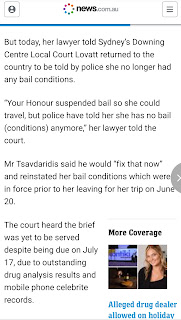The Police:
Unbeknown to the majority of the general population, the colony’s state police forces are not honourable organisations.
After all the colony’s first police force was comprised of criminals, and not honourable persons.
MANY within act with impunity and disregard for the law all because their ‘victims’ are unaware of the law or their rights.
They (the police) tamper with evidence, mislead the court, lie under oath, deliberately do not provide all information to a defendent with regards to that person’s matter.
It’s truly a game to them of how much the police can get away with, and what their victims are prepared to put up with.
If a person has been accused by police of an alleged criminal act, e.g. a traffic offence, that person will be deceived by the police and the court.
The deception by police will begin with the paperwork.
By law, or according to the Criminal Procedure Act 2009, the accused must be provided with a preliminary brief and that’s all.
There’s a problem with that, as one cannot make a plea nor seek legal advice based on a preliminary brief.
Therefore a ‘Full Brief’ must be supplied, and it’s not. e.g.:
The accused must apply or give written notice for a full brief, therefore making the procedure more complicated for the accused, where it’s all about putting up barriers for the people.
As mentioned above road traffic offences are criminal and not civil according to the statutes.
In criminal law, the burden of proof is on the accuser or the ‘informant’ or prosecution/police, when it comes to traffic offences.
But there’s a slight ‘glitch in the matrix’ as traffic offences are unlawfully classified as strict liablity or absolute liability matters meaning the first and foremost the accused is guilty of the alleged crime.
Briefly:
Absolute liability – you’re guilty and a penalty is enforced
Strict liability – you’re guilty where you have to prove otherwise
So, the law is stacked up against you from the very beginning.
Covid fines:
As of the time of this post, Victoria Police are still pursuing Covid related ‘Infringement Notices’ despite the fact they have been withdrawn as there is no lawfully enacted instrument to give rise to such an (alleged) infringement.
The CHO’s (Chief Health Officer’s) ‘directions’ are public policy, i.e. directed towards government and have zero effect on the general population.
Victoria Police are therefore wasting precious court time and Victorian taxpayer’s dollars for a futile argument, hardly an ‘honourable’ action.
The Courts:
The courts are also part of the corruption, aiding police, conspiring against those seeking a remedy or even ‘justice’.
The purpose of a court is to overview the Executive to protect the public.
First and foremost, ALL Australian courts must be under ‘Chapter III’ (of the Constitution), remebering that Royal Assent under the Queen of Australia is not lawful.
They must act solely in the Crown right.
The Magistrates Court of Victoria has ‘stakeholders’ (which are financial institutions) and its decision making process is influenced (therfore prejudiced) by those stakeholders, as seen in a MCV document in the following post:
Courts acting under dictation owned by financial services institutions
Court Services Victoria is owned by ‘stakeholders’ includig but not limited to Challenger Group and Australia’s leading banks.
The judiciary receives their paycheque from Court Services Victoria.
The courts are all about equity, Andrews v ANZ HCA [2012] HCA 30, p63.
A order made by the Court must be authenticated by the person who constituted the Court, as stated in the Magistrates’ Court Act 1989 Section 18 (2).
Judges/magistrates are tort feasors.
Australian courts are not legislative as described in Lane v Morrison [2009] HCA 29.
A registrar/deputy Registrar has no authority, as stated in R v Davison [1954], HCA 46.
Hearing – ex-parte:
It is an abuse of power, where it is against both federal and state law.
The ‘Quick and Garran’ in S206 – Service (p. 614) states, that one is not bound by judgement of court without being heard first, yet all courts in this colony execute judgements on ex-parte matters.
Both parties must be in a court hearing as described in High Court of Australia case Taylor v Taylor [1979] HCA 38.
An ex-parte hearing is a breach of a ‘fair hearing’, as stated in a law called the Charter of Human Rights and Responsibilites Act (2006) Vic, Section 24.
Your plea:
When the accused/defendant enters a court that person is lied to by the court from the very beginning,
From the front desk, the court will tell the defendant that there are only two choices of a plea, that being guilty or not guilty.
That is a plain and simple lie, a deception by the court.
There are factually 3 pleas.
Guilty or not guilty and nolo contendre or a choice the court gives you that being no plea, as seen in the court document below:
Some Procedures Regarding the Law:
The Chief Justice of the Supreme Court checks the Act against the Constitution, signing off on it, where the Governor stamps it with the Royal Identifier.
All law in Victoria, including that which was allegedly enacted during Covid, must be compatible with Human Rights, where the process is outlined within the SARC (Scrutiny of Acts and Regualtions Committee).
A Proclamaton Certifiacte MUST be issued for a law to be valid.
There are many more apects to each of the above sections, where only a few select items are mentioned in this post.
Related posts:
Views: 0
 RSS Feed
RSS Feed

















 August 17th, 2023
August 17th, 2023  Awake Goy
Awake Goy 




 Posted in
Posted in  Tags:
Tags: 
















